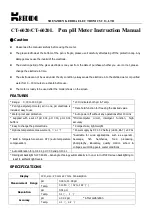
Project planning
FLOWSIC100 Flare-XT · Operating Instructions · 8023761/V1-0/2020-10 · © SICK Engineering GmbH
23
4.2
Determining the measuring and installation location for FLSE100-XT
Measurement accuracy is influenced, among other things, by flow behavior and the
position of the measuring axis. Large cross-section variations, curved pipes, fittings, air
flaps or inlets can cause profile deformations or turbulences with a negative effect on the
accuracy of the measuring result.
Select the FLSE-XT installation location at a position with as little interference as possible to
ensure best possible device performance.
4.2.1
General requirements
Criteria
Requirements
Measuring
location
Flow behavior
Position with twist-free as well as rotationally symmetrical flow profile
Balanced, uniform profiles are most likely to be expected for long inlet and outlet piping
Pipeline
design
Whenever possible, no deflections, cross-section variations, curves, feed and drain lines, flaps or
fittings in the area of the inlet and outlet piping
Inlet and
outlet piping
lengths
Isometric conditions at the measuring point are most important for determining the required inlet
and outlet piping and should be investigated carefully. The conditions depend on the specific
application and the device configuration. Typically, an upstream 20 D straight pipe section and a
downstream 5 D straight pipe section are required.
● Uncritical flow inlet conditions require straight inlet piping.
● More complex inlet disturbances require longer inlet and outlet piping.
● If the 2-path configuration is used, the needed minimum inlet and outlet sections can be further
reduced compared to 1-path measurement with the same measurement uncertainty.
● SICK offers expertise support for optimal adjustment of the meter for the given inlet and outlet
piping conditions.
Installation location
Pipelines with vertical, horizontal or inclined direction
Pipelines with horizontal or vertical direction
● Horizontal installation:
Align the spool piece so that the planes formed by the measuring paths are horizontal. This
minimizes the problem of dirt in the pipeline entering the transducer ports.
● Vertical installation:
Only possible if the measuring system is used for dry, non-condensing gases.
Installation free of vibrations, acceleration < 1 g
Largest possible distance to control valves or other noisy fixtures
With electrical connections and lighting
Working platform
Easy and safe access for installation and maintenance work of the sender/receiver units
Platform secured by a railing to prevent possible accidents
Sufficient clearance to fit/remove the sender/receiver units
Wall and insulation
thickness
● Maximum wall thickness 15 mm
Larger wall thicknesses require customer-specific solutions (available on request only).
● Minimum wall thickness depends on pressure, temperature, pipe size and static/dynamic load
at the measurement location (contact SICK for support).
Nozzles may only be isolated when the gas temperature is < 100 °C.
Ball valve, venting valve and electronics must not be insulated.
















































